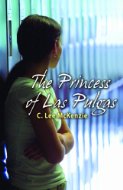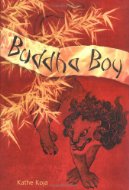Keplinger, Kody. The Duff (designated ugly fat friend). New York: Poppy - Little, Brown and Company, 2010.
[Book cover credit: librarything.com/work/9731272]
Booktalk:
Bianca is having a rough time of it. Her mom is out of town a lot. Her two best friends insist on dragging her to The Nest, a teen nightclub, every weekend. She still can't form coherent sentences in front of her long-time crush. And then Wesley, a world-class sleaseball sits down next to her at the "bar," and tries to make friends. It'll up his chances of nailing one of Bianca's hot besties, he says, being nice to their Duff, their designated ugly fat friend who they only keep around to make themselves look hotter. So Bianca does what any self-respecting girl would do: she throws her cherry coke in his face. And then she makes out with him?
Review:
I started this book ready to be disappointed. There's been so much hype, and not all of it good, that I didn't think
The Duff could possibly live up to it. Then I opened it and found a pessimistic, foul-mouthed main character that I didn't think I'd grow to care about. I brought an extra book with me to read on my commute so that i could put this one down as soon as I'd read the obligatory 50 pages (this is my personal rule for books sent to me for review). Next thing I know, I'd almost missed my train stop because I was so sucked in.
Bianca's relationship with Wesley is clearly complicated, though she tries to play it off as the simplest thing ever: just sex. Wesley seems okay with this arrangement and helps Bianca keep up appearances at school and everywhere else for a while. They hate each other. He's a man-slut, womanizing, cocky little brat, representing everything that Bianca, a smart and confident young woman, despises. And he calls her "Duffy," constantly reminding her that he's way out of her league and that their relationship could never go public. For the most part, they maintain a snarky banter both in and out of the bedroom (it's very
10 Things I Hate About You). Until they don't. Bianca is having some very real problems at home that she's avoiding by spending all of her time with Wesley. She can ignore things when she's with him; her friends will want to help and make her talk about it. Wesley just asks her if she's okay and then listens; he doesn't push. Maybe this is because he doesn't actually care (likely in Bianca's opinion) or maybe, as she comes to figure out, it's because he has real problems that he doesn't want to talk about either.
Other reviewers have said that the relationships between Bianca and her friends is what "saved" this book for them. Their friendship is sweet, fierce and awesome. They build each other up with nary an insult. Bianca ditches her friends for Wesley and doesn't even tell them about him. I think this happens a lot (it certainly did when I was in college), and to see it portrayed here was great. Bianca's friends are both pissed and worried, and both those sentiments are clearly expressed. No one is one-dimensional. When Bianca finally spills all to her friends, they (mostly) forgive her. Casey decides to make the word duff theirs. Instead of having a fat day or a bad hair day or even a zit, they say it's their turn to be the Duff. Though the word catches Bianca off guard throughout the book, it loses it's power to make her feel ugly and fat, exactly what the word is supposed to imply.
Overall, I enjoyed this book. It's all about relationships, between Bianca and her friends, Bianca and her parents, Bianca and Wesley, but it's not weighed down by emotional drama. Sure, there are really emotionally draining parts of this book, especially when it comes to Bianca and her parents, but they are tempered by sarcasm, sex, and Bianca's own personality.
Book source: ARC provided by the publisher.
Now, about the SEX:
Feel free to skip this part. I wrote my thesis on
Forever... by Judy Blume and its effect on the uses and appearances of sex in literature for girls, and I saw in an interview (that I can no longer find - if it was on your blog, let me know so I can link to it!) that Keplinger was inspired by the frank discussions of sex in
Forever... when writing
The Duff. I can't let that just go without comment and comparison.
Now, in
Forever..., there is a whole chapter about going to Planned Parenthood for birth control. There is an author's note in every edition published since AIDS became known and prevalent about how birth control is no longer enough, protecting oneself against STIs is just as important as preventing pregnancy. This information, both in the PP chapter and the author's note, are pretty separate from the story. Yes, going to PP is a turning point for Katherine, showing that she's ready to have sex, but the wealth of information about exactly what happens in a birth control appointment has nothing to do with the story. It's there so that readers aren't afraid to make that appointment themselves; it's showing them how to do it in real life.* It's very didactic. It's very 80s. For a book published in the 70s, it was very ahead of its time.
We don't get that in
The Duff. This book has boatloads of sex, but it's not the this-is-how-it's-done sex that appears in Blume. The sex in
The Duff is not graphic. It doesn't happen "off-screen," but the reader is not treated to a play-by-play all that often. What is present, however, is the word condom every time Bianca and Wesley do it. It's much more subtle than Blume's way of telling readers to use precaution, but because of that, it's less likely to be skimmed. It's right there in the story. It's natural, almost taken for granted, that Wesley and Bianca will use a condom every time. Later on, Bianca mentions that she's been on birth control for years. It's no big deal. She went on birth control (with her mother's knowledge) when she started having sex. It's just what you do.
Unfortunately, I don't think either approach is all that realistic. It is for some teens, thank goodness, but not for all. Both books also show a teen pregnancy or pregnancy scare. Blume is, again, way more obvious about it. If you don't do as I've shown you, you'll have a baby instead of going to Smith! But Keplinger, too, aims to show consequences. When Bianca is talking to Vikki, the school slut, about her pregnancy scare she thinks, "Had all of this made her realize the consequences of her choices?
Our choices" (256).** Even though Bianca is on birth control and is sleeping with a guy who buys condoms in bulk, she recognizes that she and Vikki could easily be in the same boat. It's a huge a-ha moment for her. Calling Vikki a slut doesn't make Bianca anymore of a virgin or less likely to get knocked up. Calling someone else a duff doesn't make her more beautiful. The lesson is different, but it's told in the same way.
Something that I did think is way too realistic in
The Duff was the treatment of oral sex, something that isn't even broached in
Forever.... The thing that bothered me is that when Wesley, who always always has a condom in his pocket, goes down on Bianca, he doesn't use any kind of protection. The idea that oral sex isn't real sex is prevalent among teens. It's dangerous. I was a little disappointed that Keplinger had been SO GREAT throughout the book with the condoms and the birth control (and all without breaking up the story!), but didn't even mention a dental dam here. But turning a condom into a dental dam would have created a "let's go to PP" chapter in an otherwise clever and not remotely heavy-handed book about safe sex. It's still a little upsetting though.
I don't know if Keplinger meant for
The Duff to be about safe sex so much as it was about how running away from your problems doesn't solve them (with a lot of sex). Regardless, I applaud her efforts to portray responsible choices even in the midst of an "enemies-with-benefits" relationship where sex is had for all the wrong reasons.
*For a more extreme example of this tactic of providing information about something some might think is squicky or controversial for young readers, see the "I'm bleeding to death from between my legs" chapter in the
Alanna: The First Adventure. Getting her period has nothing to do with the story, but everything to do with being a preteen girl, as Alanna is.
**Quotes and page numbers were taken from an uncorrected proof and my not match the published copy.
 Katcher, Brian. Almost Perfect. New York: Delacorte Press - Random House Children's Books, 2009. Print.
Katcher, Brian. Almost Perfect. New York: Delacorte Press - Random House Children's Books, 2009. Print.















